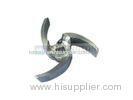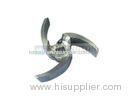

Mechanical Impeller Investment Casting Of Stainless Steel CF8M By Ceramic Shell Process
| Place of Origin: | Zhejiang |
|---|
Company Profile
| Location: | Huizhou, Guangdong, China (Mainland) |
|---|---|
| Business Type: | Manufacturer |
| Main Products: | Precision Investment Casting, Carbon Steel Investment Casting, Alloy Steel Investment Casting |
Product Detail
| Model No.: | Impeller investment casting 005 |
|---|
Product Description
Mechanical Impeller Investment Casting Of Stainless Steel CF8M By Ceramic Shell Process
- Stainless steel Impeller investment castings for food processing machinery, flow control devices, stainless steel CF8M(SS316).
- Process: Silica Sol Lost wax casting;
- Wax type: Medium temperature wax;
- Weight: 1.5kg;
- NDT service such as X ray test, Dye test are available;
- Offer hand polishing service;
Stainless Steel (70%) | Carbon Steel | Alloy Steel |
CF3M (AISI 316L), CF8M (AISI 316), CF8 (AISI 304),CD4MCu, CD4MCuN,ANC20,1.4408,1.4517, 1.4306, 303, 430, 420, 17-4PH, SCS1 and more | SCS16, SCS14, SCS13, 1.0619, WCB, S355JR, 1045 , LCC and more | ANC2,CLA12C,42CrMo,8Q,4140,6150 and more |
- Wax die making: Our wax tooling is made of Aluminum which is easy for machining and fast for cooling, at the same time, light for handling.
- Wax injection: Filling the entire mould with molten wax, and let it cool, until a desired wax pattern is shaped and harden.
- Assemble the wax patterns: The wax patterns are welded to a runner system by a heated metal tool according to a certain pattern cluster(tree) design.
- Investment: The ceramic mould, known as the investment, is produced by three repeating steps: coating, stuccoing, and hardening. The first step involves dipping the cluster into a slurry of fine refractory material and then letting any excess drain off, so a uniform surface is produced. This fine material is used first to give a smooth surface finish and reproduce fine details. In the second step, the cluster is stuccoed with a coarse ceramic particle, by dipping it into a fluidised barrel, placing it in a rainfall-sander. Finally, the coating is allowed to harden.
- Dewax: The investment is then allowed to completely dry, which can take 16 to 48 hours. It is then turned upside-down and placed in a autoclave to melt out and/or vaporize the wax.
- Burnout & preheating: The mold is then subjected to a burnout, which heats the mold to remove any moisture and residual wax, and to sinter the mold. The mold is preheated to allow the metal to stay liquid longer to fill any details and to increase dimensional accuracy.
- Pouring: The investment mold is then placed cup-upwards into a tub filled with sand and be poured.
- After treatment: The shell is then hammered, media blasted, vibrated, waterjeted, or chemically dissolved to release the casting. Further actions like weld repairing,grinding, shot blasting,CNC machining, electro plating will be taken to get a final cleaned precision casting part.
Specifications:
Standards | ASTM,JIS,DIN,BS,MIL |
Maximum Casting Size | 500*500*350mm |
Casting weight | 10g~80kg |
Wall thickness | 1.5-2mm Min |
Casting process type | silica sol lost wax casting |
Machining | CNC machining, CNC lathe |
Surface finish | electro polishing, satin, hand polished, pickled, zinc plating, vibratory polishing; |
Tolerances | According to VDG P690 |
Physical performance | Tensile test, Impact test, Hardness test |
Chemical composition test | Spectrometer |
NDT test | Dye test, X ray test etc |
Applications:
Pumps
Valves
Pipe Fittings
Automotive
Marine and Oil
Machinery
Power & Energy
Construction


